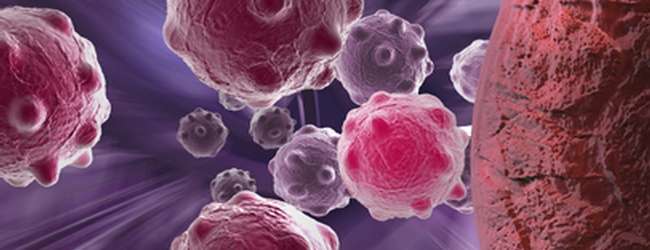New bowel cancer drug starts clinical trials

Today, a new drug will become available for patients with bowel cancer as part of a national clinical trial; based on a scientific discovery made only two years ago at the CRUK/MRC Oxford Institute for Radiation Oncology.
An Achilles' heel of certain cancer cells – mutations in a gene called SETD2 – was discovered by a yeast genetics research group led by Professor Tim Humphrey at the Institute. Professor Humphrey and his team showed that cancer cells with a mutated SETD2 gene were killed by an experimental drug being developed by Astra Zeneca called AZD1775, which inhibits a protein called WEE1.
The new research is exploiting the concept of 'synthetic lethality', in which a combination of two factors specifically kills cancer cells. This has the potential to be less toxic and more effective than existing treatments.
Collaborating with Dr Andy Ryan's group in Oxford, the two labs developed a test which would work in human cells to identify the presence or absence of SETD2. They found that about 1 in 10 bowel cancers and up to 50 percent of kidney cancers lose this marker and so have this susceptibility to being targeted with the drug. The mechanism of activity and the marker which identified the susceptible cells was published in Cancer Cell in November 2015.
The translational potential of this research was quickly developed by the CRUK/MRC Oxford Institute for Radiation Oncology, where clinical and basic scientists worked together with scientists at AstraZeneca to rapidly move the discovery towards a clinical trial.
The clinical trial will commence today, as part of the existing national FOCUS4 trialopens in new window for patients with bowel cancer, which is open in 100 hospitals across the UK and coordinated by the Medical Research Council (MRC) Clinical Trials Unit at University College London.
Patients whose tumours lack a special histone marker will be eligible to enter a new part of the study testing the WEE1 inhibitor AZD1775. Patients who have bowel cancer which has spread to other organs and are inoperable can also be registered for the FOCUS4 trial during the initial 12 weeks of their first line treatment and have their tumour tested. The drug is not available except through ethically approved clinical trials.
Professor Tim Maughan, Chief Investigator of FOCUS4, from the CRUK/MRC Oxford Institute for Radiation Oncology, said: "We are very excited that we are able to test this very new approach to treatment for our bowel cancer patients. It is remarkable to be able to take a discovery in yeast cells through to opening a clinical trial on that evidence in less than 2 years. FOCUS4 was designed with this ability to move forward rapidly with new discoveries and test them in patients whose tumours express the characteristics which are predicted to make them sensitive to the new treatment. I am very hopeful this will bring benefit to our patients with bowel cancer."
Professor Matt Seymour, one of the FOCUS4 clinical investigators and lead for cancer in the National Institute for Health Research Clinical Research Network, said: "What we are seeing here is seamless cooperation between highest-level university science, a major UK-based company, charity, the NHS and our world-leading government-supported clinical research infrastructure. This is UK medical science at its best and most efficient, and a great example of how our joined-up approach can drive exciting inventions rapidly though to clinical research with the potential to benefit NHS patients."
Professor Tim Humphrey, Senior Group Leader in the CRUK/MRC Oxford Institute for Radiation Oncology, said: "We are excited to have discovered a new way to specifically kill bowel cancer cells with this mutation. To see our work in yeast potentially make a difference to patients in the clinic is very encouraging and shows the value of working together in a larger team of scientists within an Institute."
Dr Anderson Ryan, Senior Group Leader in the CRUK/MRC Oxford Institute for Radiation Oncology, said: "We're now in the era of precision medicine and patients hope that new treatments will be targeted to their particular disease. This biomarker-driven trial aims to do just that – by using the molecular characteristics of tumours to decide which treatment to offer."Malcolm Pope, a former bowel cancer patient, commented: "As a patient, who was fortunate enough to be enrolled on a trial and given new treatment which worked for me, I feel that the progress being made in the Focus4 Trial regarding personalised cancer medicine is both exciting and greatly beneficial for today's patients."

















